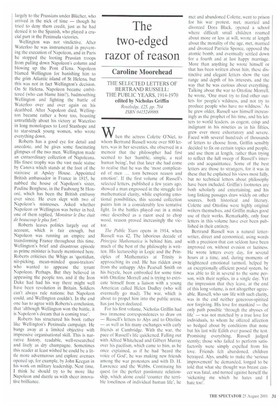The two-edged razor of reason
Caroline Moorehead
THE SELECTED LETTERS OF BERTRAND RUSSELL: THE PUBLIC YEARS, 1914-1970 edited by Nicholas Griffin Routledge, 125. pp. 704 ISBN 0415249988 When the actress Colette O'Niel, to whom Bertrand Russell wrote over 800 letters, was in her seventies, she observed in a memoir that the philosopher had first seemed to her 'humble, simple, a real human being', but that later she had come to realise that he was the 'most complicated of men ... torn between reason and emotion'. If the first volume of Russell's selected letters, published a few years ago, showed a man engrossed in the struggle for mathematical clarity, while exploring emotional possibilities, this second collection paints him in a considerably less tentative light. In the battles played out in a mind once described as a razor used to chop wood, reason proved increasingly the victor.
The Public Years opens in 1914, when Russell was 42. The laborious decade of Principia Mathematica is behind him. and much of the best of the philosophy is written. His lectureship in Logic and the Principles of Mathematics at Trinity is approaching its end. He has ridden away from the unhappy Alys Pearsall Smith on his bicycle, been embroiled for some time with Ottoline Morrell and is trying to extricate himself from a liaison with a young American called Helen Dudley (who will eventually go mad). The war, which is about to propel him into the public arena, has just been declared.
For his first volume, Nicholas Griffin had two immense correspondences to draw on — Russell's letters to Alys and to Ottoline — as well as his many exchanges with early friends at Cambridge. With the war, the pace of Russell's life quickened. Falling out with Alfred Whitehead and Gilbert Murray over his pacifism, which came to him, as he once explained, as if he had 'heard the voice of God', he was making new friends among the war protesters and with D. H. Lawrence and the Webbs. Continuing his quest for the perfect passionate relationship, which alone could 'counter the terrible loneliness of individual human life', he met and abandoned Colette, went to prison for his war protest, met, married and divorced Dora Black. opened a school where difficult small children roamed about more or less at will, wrote at length about the morality of the age, met, married and divorced Patricia Spence, opposed the atomic bomb, and eventually settled down for a fourth and at last happy marriage. More than anything he wrote himself or that has been written about him, these distinctive and elegant letters show the vast range and depth of his interests, and the way that he was curious about everything. Talking about the war to Ottoline Morrell, he wrote, 'One must try to find other outlets for people's wildness, and not try to produce people who have no wildness.' As he grew older, Russell saw himself increasingly as the prophet of his time, and his letters to world leaders, as cogent, crisp and indignant in his nineties as in his fifties, grew ever more exhortatory and severe. Faced with several hundreds of thousands of letters to choose from, Griffin sensibly decided to fix on certain topics and people, and use them at length, rather than trying to reflect the full sweep of Russell's interests and acquaintance. Some of the best letters are those to strangers, for it was in these that he explained his views most fully, but no technical letters about philosophy have been included. Griffin's footnotes are both scholarly and entertaining, and his long linking passages draw widely on other sources, both historical and literary. Colette and Ottoline were highly original writers themselves, and Griffin makes good use of their works. Remarkably, only four letters in this volume have ever been published in their entirety.
Bertrand Russell was a natural letterwriter, direct and economical, using words with a precision that can seldom have been improved on, without evasion or laziness. He wrote letters every day, for several hours at a time, and, during moments of heightened emotional turmoil, helped by an exceptionally efficient postal system, he was able to fit in several to the same person, with their replies, in a single day. Yet the impression that they leave, at the end of this long volume, is not altogether agreeable. Russell, who saw life with such clarity, was in the end neither generous-spirited nor forgiving. His love for mankind — the only path possible 'through the abysses of life' — was not matched by a true love for individuals, to whom he offered affection so hedged about by conditions that none but his last wife Edith ever passed the test. Promising everything, Russell judged sternly; those who failed to perform satisfactorily were simply expelled from his love. Friends felt abandoned, children betrayed. Alys, unable to make the 'serious improvement' he demanded, longed to be told that what she thought was breast cancer was fatal, and turned against herself the 'sickening me which he hates and I hate too'.


























































 Previous page
Previous page